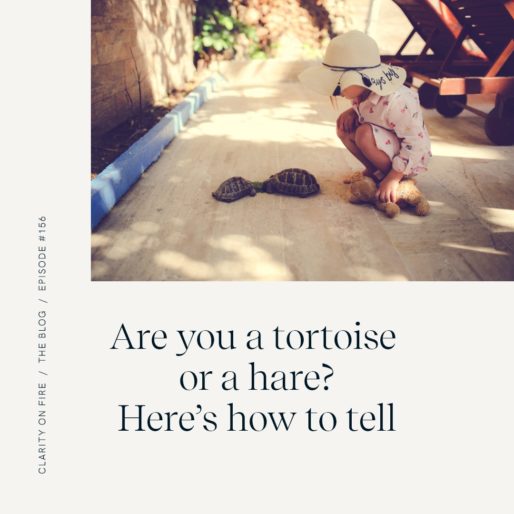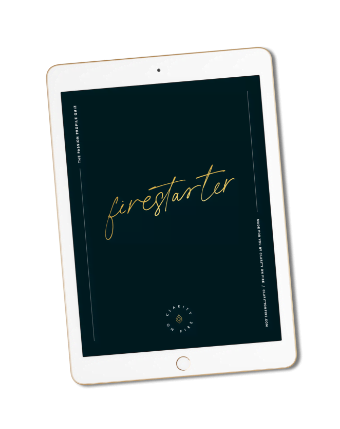Click the play button below, or subscribe and listen through our podcast on iTunes, Stitcher, Google Play, or Spotify.
Podcast: Play in new window | Download
I’m slightly obsessed with Malcolm Gladwell’s podcast Revisionist History. It appeals to my nerdy, inquisitive side.
In case you’re curious, here’s the official description of his podcast:
“Revisionist History is Malcolm Gladwell’s journey through the overlooked and the misunderstood. Every episode re-examines something from the past — an event, a person, an idea, even a song — and asks whether we got it right the first time. Because sometimes the past deserves a second chance.”
In season 4 of his podcast, he started out with a two-part series about the LSAT, in which he described a distinct difference between two types of people that I haven’t been able to stop thinking about since I originally heard it months ago.
He categorized most people as being either “tortoises” or “hares.”
Whether you’re a tortoise or a hare impacts everything in your life, from the way you work, to the way you communicate, to the way you think.
Neither is better or worse, but trying to go against your type is going to feel miserable, frustrating, and unsustainable.
Honestly, this distinction has been as impactful to me (and to many of my clients, who I’ve been sharing this with) as learning that I’m an introvert, not an extrovert.
It’s a game changer.
Let’s get into what it means to be a tortoise vs. a hare, how to tell which type you are, and how to work WITH your type, instead of against it.
LIFE AS A HARE
Hares are people who get a lot done in a short amount of time.
He was the kid in your high-school classes who always turned his test in before everyone else. She’s the first to share an idea or a solution in a work meeting.
Their minds have an Energizer Bunny quality to them.
They’re quick with a retort or an idea, sometimes without fully thinking it through. Because they’re so freaking efficient, they can juggle a lot of tasks and deadlines at once with relative ease, although sometimes things can fall through the cracks because they’re so quickly moving onto the next thing.
They tend to be more linear with their way of thinking and getting work done — work on this, then complete this, then move on to this. Check, check, check.
They’ll feel restless if a meeting is taking too long or meandering off topic. And they can get impatient waiting for other people to finish their part of a project.
Bestselling author James Patterson is a hare. That man is prolific, reliably cranking out multiple books every. Single. Year. It’s incredible.
Just like everything in life, being a hare comes with its pros and cons:
Pros:
- Hares are efficient, working through their to-do list with ease.
- Because they’re such quick thinkers, they’re great with on-the-spot answers, and they’re especially useful in a crisis.
- They’re great at meeting deadlines, and they’re much more likely to thrive in faster-paced, high-pressure situations and working environment.
Cons:
- By thinking and working so quickly, they often miss more subtle nuances and depth.
- Because they respond in-the-moment, they sometimes regret their reaction or change their mind later on, once they’ve had more time to process the situation.
- They’re not especially detail-oriented, since getting that far down in the weeds would require slowing down.
LIFE AS A TORTOISE
Tortoises are slow, methodical, and deep thinking.
They do not get a lot done in a short time. But when they are finally done, they’ve done a thorough job.
These are your in-the-weeds people, and they can’t help but examine something from all angles, sometimes getting lost in the details, but coming out with a deep understanding of the thing.
They’re prone to meandering, following tangents, going down rabbit holes, and generally following their curiosity wherever and however deep it leads. Their minds naturally take the metaphorical windy backroads to get to their destination, not the more efficient highway.
It might take them multiple times as long to finish a project as it would a hare, but the final product will be deeply thought-out and well researched, and they’ll have a detailed understanding of all facets of it.
They may seem quiet or even detached in a conversation or meeting because they’re not saying much, but that’s because they’re taking their time to process it all.
Adele is a great example of a tortoise. She’ll go dark for longstretches of time, and we’re lucky if we get a new Adele album every 3-4 years. But when she finally emerges with her latest creation, it’s pure gold.
Being a tortoise also comes with its pros and cons:
Pros:
- Tortoises produce high-quality, detailed, well-thought-out work.
- They’re more likely to discover interesting connections between concepts, ideas, and possible solutions because of their tendency toward mental meandering.
- They end up being go-to experts on certain topics because they’ve immersed themselves in the material.
Cons:
- They’re unlikely to have a good idea or response in the moment, and they often kick themselves later once they have time to think of what they wish they’d said.
- They’re easily stressed by ticking deadlines, and their work quality plummets when they feel rushed.
- They’re not great multi-taskers, since their natural preference is for quality over quantity.
KNOWING YOUR TYPE MAKES ALL THE DIFFERENCE
Whatever your type, you probably feel prejudiced against at times.
Hares often feel like they should be more of an “expert” on a particular topic, since our culture believes that expertise = success. But hares would much rather maintain their high-level understanding and not get bogged down with the details.
Tortoises often feel even more misunderstood in our fast-paced world, simply because our modern society puts a premium on speed and instant gratification. Most people and companies lack the patience necessary to allow tortoises to do their best work.
The worst, however, is when you put pressure on yourself to be different from how you’re naturally wired.
If you’re a hare, trying to think or work like a tortoise is going to feel tedious and maddening to you. And if you’re a tortoise trying to emulate a hare, you’ll constantly feel stressed and like you’re not putting out quality work.
We may not be able to change our culture’s perception of tortoises and hares (although here’s hoping we get there one day), but you can accept yourself for whichever type you are and seek out people, experiences, and jobs that are best suited for you.
HOW TO WORK WITH YOUR TYPE, NOT AGAINST IT
One of my clients is a tortoise, and learning this about herself has been eye-opening. She told me that she’s spent most of her life trying to be a “good-enough hare,” when really she just wanted to go at her naturally slower tortoise pace.
She was recently trying to decide between a few possible role changes within her company and was feeling torn. One of them, which she felt she “should” apply for, was with a competitive, fast-paced, deadline-driven team.
She’d been procrastinating applying for that role, and now could finally explain why: It was a perfect job for a hare, but she would’ve always felt out-of-sync with that team and their pace of work.
Ultimately, she was able to let that role go, angst-free, and instead apply for a position that better suited her tortoise nature.
Another of my clients is a true hare. She’s known for getting her work done quickly and efficiently, usually well before the deadline.
Because she works faster than most of her coworkers, she often gets asked to take on some of their spillover work. She came to me asking how to feel less grumpy about being “rewarded” for her efficiency by being expected to do more work for people who are behind.
I told her that the cool thing about being ahead of schedule and having a bit of downtime is that she can pick and choose what things she wants to help other teams out with and what she’d rather decline.
Instead of feeling resentful for getting extra work piled on her plate, she could ask herself, “What are some things that I’m curious to try or learn more about that I don’t get to do on a daily basis?” and only agree to help with those types of tasks. Or better yet, preemptively request to help with those things, before other people ask her to do more mundane or annoying tasks.
Now, she gets to keep being the efficient hare that she is, and she’s also more in control of how she uses her “downtime” at work once her daily to-do list is done.
Whether you’re a speedy hare or a slow-and-steady tortoise, life gets easier when you accept how you’re wired and take life at your preferred pace.
I’d love to hear from you: Are you a tortoise or a hare? How have you been working or living in opposition to your type, and how can you get more in-sync with your natural pace? Leave me a comment to let me know!
Much Love,
Kristen (& Rachel)



I’m a Tortoise! The description fits so well. I have had this school project unfinished for such a long time now and everyone wonders why (including me) I haven’t finished it yet.
But today I realised that it’s because of my personality. I feel so unprepared or ready to do it because I don’t have all the facts and information and process that I think I need.
My problem is how do you make others understand your personality because it does affect the relationship with others who may label people with the Tortoise personality as lazy. Meanwhile, they are only taking their time to do things right! And calling a Tortoise lazy is really bothering.
Ngumabi.
Ngumabi — I’m also a tortoise, so oh man do I get this! It’s so tough when you want to work at your own, slower pace, but you feel rushed by others’ deadlines, misinterpretations, and expectations.
You may not be able to make everyone understand your tortoise personality, but that doesn’t mean you shouldn’t still try to communicate clearly what you need in order to work in a way that best suits you. Just like introverts might need to state their need for some solo downtime to the extroverts in their life, you might need to explain your need for collecting all the facts, clarifying your process, and having longer stretches of dedicated research/working time in order to do your best work. When you explain that your slower, steadier approach is actually the OPPOSITE of lazy, you might change some people’s minds about what it means to be a tortoise. But there are always going to be people who don’t “get” you and misinterpret your personality, so the most important thing is to accept yourself for being a tortoise and advocate for what you need in order to do your best work.
I also hope you’ll listen to Malcolm Gladwell’s podcast episodes (part 1 and part 2) about the tortoise & the hare, because he really advocates for misunderstood tortoises, so I think you’ll resonate with it! 🙂